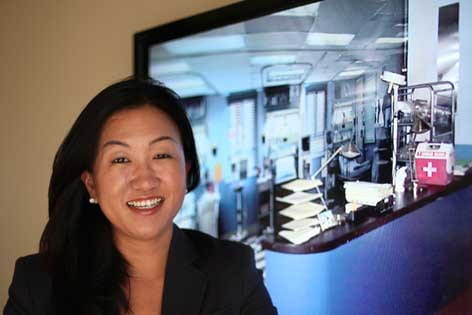Show biz becomes academic
UC Irvine graduate finds her niche in the emerging field of entertainment education doing research fro medical shows.

After years of cultivating her passion for interdisciplinary studies, recent UC Irvine graduate Sheena Nahm is flexing her academic research muscles in the entertainment capital of the world. Nahm, who received a doctorate in anthropology last June, is a research specialist for the Hollywood, Health & Society program at the University of Southern California Annenberg Norman Lear Center.
She conducts original research and helps collect data on how much health education TV viewers derive from entertainment shows. The concept of “entertainment education” is creating a buzz in health communications circles, she says, because hit shows can reach millions of people – far more than standard health marketing campaigns.
“If we can better understand and explore entertainment education,” Nahm says, “it could open up different ways to think about public health education in general.”
Q. What is Hollywood, Health & Society?
A. It’s a program that provides entertainment industry professionals with accurate and up-to-date information for health-related story lines. Although HH&S is an educational resource for shows like “Grey’s Anatomy” and “House,” our work is not limited to medical dramas. We may connect medical experts with writers on a soap opera featuring a character dealing with cancer. We’re funded, in part, by the Centers for Disease Control & Prevention and work with CDC doctors, among other experts, to create tip sheets for writers and producers. Besides supplying credible information, reliable experts and engaging case examples, HH&S also collaborates with communications researchers and TV executives in studying the content and impact of health-based story lines on shows.
Q. What do you do?
A. As a research specialist, I manage various projects and formulate pre- and postshow surveys on audience knowledge, attitudes and behavior. This data lets us measure the educational value of health issues tackled in a show and contributes to rigorous research in health communications fields. What a lot of surveys reveal is that viewers can’t help but come away with increased knowledge, even though they’re tuning in for entertainment. It’s also great for writers and networks to know that what they do has social impact.
Q. What was your job search strategy?
A. I started working the week after I graduated from UCI. Especially in this economy, I feel doubly – triply – fortunate, because I really enjoy my job. I was searching from September 2008 through graduation; it often takes that long for academic job interviews. But I wanted to cast a wide net and look at nonacademic jobs too. I think there’s a lot to be said about being creative and open and just persevering. When I didn’t want to fill out another application, I told myself: “I have to get out there.”
Q. What is your educational background?
A. Initially, as an undergrad, I was premed. I ended up double-majoring when I developed an interest in cultural anthropology. So I received bachelor’s degrees in the biological basis of behavior and in anthropology from the University of Pennsylvania. It was a hectic senior year – completing honors theses for both majors – but totally worth it to be exposed to diverse perspectives. I then earned a master’s in public health at Drexel University, emphasizing community health and prevention. When I decided to pursue a doctorate in anthropology, I chose UCI because its anthropology program is among the best in the country. At Irvine, I was engaged in really interesting, unexpected, complex and contemporary projects. It was also a great community of scholars – both faculty and students. They modeled for me the kind of scholar, researcher and teacher I’d like to be.

